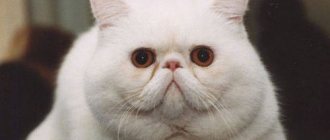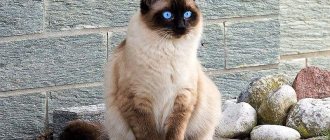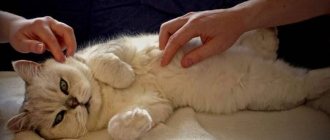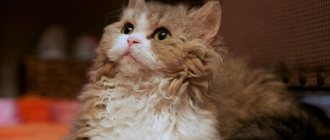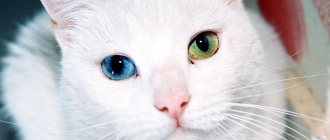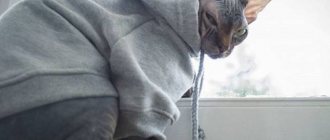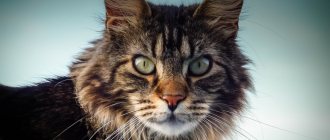The most accommodating cats
If you have a lot of pets in your house, then choose the most friendly cats that will not quarrel with dogs or offend birds and fish.
Ragdoll
Translated from English, ragdoll means “rag doll.” The cat received this name for its ability to relax its muscles when it is in the hands of a person. At the same time, it really does resemble a soft toy.
These cats are also compared to puppies for their habit of following their owner everywhere. He simply cannot imagine his life without an owner, and there are times when a cat even refuses to eat until his beloved owner appears again.
Ragdolls have a calm and even temperament and are very good with children. No matter what children do to them, even turning them into their own doll with which they can do whatever they want, ragdolls endure it without complaint.
Somali cat
The Somali is exactly the kind of animal that children will not get bored with. Even when a cat grows up, she still loves fun things to do. Playfulness is in her blood. And she will never hurt the baby.
The Somali cat is also very beautiful: soft thick fur, fluffy tail, playful look. She has a good disposition, but the cat is very lively and does not like to sit in one place for a long time.
Sphinx
The mysterious cat without hair is a very friendly creature, especially since people who are allergic to cat hair can get along with him. The Sphinx really needs care and attention, so it is ready to adapt to the character of its owner.
Manx cat
A distinctive feature of cats is the absence of a tail. But this “flaw” does not harm the cat in the least and does not deprive it of its charm. They are also playful like Somalis and love to purr on their owners' laps.
Cats get along with many pets, as they are very sociable and not aggressive. Even going on a visit is not a problem with them. Manx quickly get used to their new home and enjoy getting to know its inhabitants.
Burmese or temple cat (sacred burmese)
They came from crossing Siamese and Persian. One of the most delicate semi-long-haired cats. Reserved, proud, mannered and affectionate, Burmese gladly accept the delight and admiration of guests and family members. They can be squeezed and stroked endlessly. They love children and happily take part in outdoor, active games.
Owners claim that temple cats intuitively sense the owner’s mood, can climb into their arms and purr soothingly.
You can buy such a miracle for at least 20,000 rubles. For a kitten from a nursery that will subsequently take part in exhibitions, you will have to pay 50,000 rubles or more.
"Apartment" breeds
There are quite a few breeds that are ideal for apartment living.
For small spaces
Such cats should not be very large in size, with an average level of activity. The following breeds meet these requirements:
- Persian;
- sphinxes - Canadian, Donskoy, Peterbald;
- Russian blue;
- British Shorthair;
- Scottish fold and straight-eared.
Scottish Fold is great for small spaces
Easy to care for
A common requirement when choosing a cat for an apartment is ease of care. Sphynx cats that lack hair cause the least problems. In addition, they are characterized by reduced sexual activity. This means that you don’t have to be afraid of the smell from the “marks”, as well as the inappropriate behavior of females during the period of “estrus”.
Hairless breeds are incredibly clean
The Scottish Fold breed has a short coat, so it rarely needs to be brushed. She is trainable and quickly gets used to the litter tray. These are pretty clean cats.
Character
Persians are the embodiment of calm. They idolize their owner and follow him everywhere. These cats rarely show aggression, even towards guests and children
Persians are silent and attract the owner's attention with their expressive gaze. Their disadvantage is their long coat, which requires grooming.
And you will also have to put up with snoring. This is due to the structure of the nose. Their close relatives are the exotic shorthaired breed, which are somewhat easier to care for.
The Sacred Burma is intelligent, well trained, with “aristocratic manners.” She is affectionate and calm and does not get angry. Burmese get along well with other pets. But it has some disadvantages. For example, these cats are frightened by loud noises and do not tolerate heat well.
The Ragdoll needs the affection of its owner and cannot stand being alone. These are kind and patient cats. They rarely scratch, avoid conflicts, and are easy to train. Ragdolls cannot stand rudeness and are offended by such treatment. One of the disadvantages of the breed is that it must be protected from heights: the cat can be seriously injured if it falls, since it does not know how to group itself.
Ragdoll willingly accepts his owner's caresses
The following also have good character qualities for living in an apartment:
- British Shorthair;
- American Shorthair;
- Selkirk Rex;
- Manx;
- Neva Masquerade;
- European Shorthair;
- Russian blue;
- toyger;
- sokoke.
Sokoke - a gentle native of Africa
Top 8 largest domestic cats
Sphinx
The breed unites Canadian, Don and St. Petersburg Sphynxes, but they all have a common quality - the need for affection and human warmth. Sphynxes are very good-natured and gentle animals that love to be the center of attention. They socialize easily and get along with other animals.
The price varies from 7,000 to 75,000 rubles, depending on the purity of the breed.
We choose kind and affectionate cats
According to experts, the character of a cat directly depends on the breed. But regardless of this, animals retain the natural instincts that they inherited from their ancestors. Both purebred and mongrel cats can have different personalities. Although, it should be noted, there are cat breeds that can easily live in a family, they do not have aggressive character traits.
It is difficult to list all the varieties of these animals, because one can be forgotten, thereby causing offense to their owners. Each of them considers their pet the kindest and most affectionate. Even individuals of the same breed can have different personalities. Everything will depend on the conditions created for them
If cats are surrounded by care and attention, it is difficult to imagine that they can grow up aggressive
Today, many breeders dream of breeding the kindest cat breeds. We need individuals who are distinguished by their tenderness, the ability to sing songs to their owners, and rejoice at their arrival. If we talk about outbred cats, even good care cannot guarantee that a truly affectionate and kind cat will grow up.
Abyssinian cat
The behavior of graceful Abyssinians, similar to ancient, sacred cats, is in fact far from regal. Owners of these breeds note that they are the most loyal, affectionate and intelligent animals with a good disposition. They are active, inquisitive, love to play with family members, entertain themselves with some harmless games, or simply sleep on their owner’s lap. Confirmation of their intelligence is that Abyssinians can easily learn simple commands (such as “come to me,” “place,” “jump,” etc.) or tricks (catching soft balls in flight).
The price of “club” kittens starts from 25,000 rubles.
Siberian
The ideal embodiment of a truly Russian pet is a good-natured character, a strong physique and a warm fur coat. The very name of the breed evokes associations with a broad soul and incredible, wild beauty. Siberians are strongly attached to the house and owner, although they can go for a walk. They patiently endure the cuddles of children and are not vindictive at all, since even adult cats always remain kittens at heart. Despite their playful disposition, Siberians are smart. They instantly understand the essence of prohibitions and never repeat dangerous mistakes, respecting the authority of the owner. They quickly understand what is wanted from them, so there are never any problems in raising the breed.
Neva Masquerade
Discreet and noble, cats of this breed are also incredibly affectionate. This is a wonderful companion for everyone in the family. It is worth noting that in relationships with children, the cat shows patience and calmness. He does not let go of his claws even in the most unpleasant situations; he will try to carefully get out of the child’s hands and hide for some period. He will not take grievances out by damaging furniture or slippers.
She will never force herself to be petted, but she will happily sit on her lap and will accept affection if the owner is so inclined. Affectionate and kind.
Difficulty in care
Every cat requires grooming, but some breeds require more or less attention. Difficulty in content can both depress and delight - consider your desires and capabilities.
Cats that do not require special care
If you don’t want to spend your evenings combing wool or thinking about your pet’s menu, pay attention to the following breeds:
Short fur and sparse shedding
Cat for lovers of black clothes
Easy to care and maintain
Enough to feed and pet
Almost no shedding
Siamese cat
Suitable for even the laziest owner
This is an abbreviated list, but the easiest cats to care for are those with short hair and no quirks in appearance.
Long-haired cats often shed and require careful grooming, while hairless cats get cold and sweat. Pets with short hair are an excellent choice for a busy owner.
Difficult breeds to keep
Are you a passionate cat lover and ready to devote a considerable amount of time to caring for your pet? Then take a closer look at these breeds:
In winter it will never leave the battery
Freezes in the cold, sweats in the heat
A big cat has more fur
Thick fur sheds heavily
Lazy and fluffy
Scottish lop-eared
Curled ears need to be cleaned regularly
Sphynx cats are cold cats who want constant warmth and care. The Persian cat is complex due to its record length of fur, which constantly gets tangled into tangles. In addition, Persians have a flat face, which can cause them to get sick often.
It is not easy to care for cats with unusual ears: Scottish Fold or American Curls. Also, all long-haired breeds can be considered difficult-to-care cats.
Scottish breed
According to one version, the Scottish Fold originally came from China and was brought to Europe by an unknown sailor. According to another, the homeland is Scotland.
This breed is easily recognized by the structure of the ear, caused by a genetic mutation. The Scottish Fold or Scottish Fold is a domestic cat. The only cat that can stand on its hind legs without training and often sleeps on its back. Very playful and very tame, easy to train.
They get along well with other pets and are afraid of loud noises. Families with small children are better off taking older kittens.
Caring for a Scotsman is not difficult. It is enough to fulfill the following requirements:
- proper nutrition;
- infrequent washing and combing;
- care for eyes, ears and claws.
Scottish Folds are prone to certain types of diseases. Primarily prone to joint problems. Due to the shortened muzzle, cats of this breed may experience breathing problems, which can lead to death.
The price of a Scot is 5 - 15 thousand rubles.
The Twelve Most Affectionate Cat Breeds
The cat's character, of course, equally depends on the gene and the conditions in which the animal lives.
The beloved kitten will share tenderness with everyone; intimidated and withdrawn - wary of people.
However, scientists have identified the 12 most affectionate modern breeds of domestic cats.
12th place – Exot
If you want a pet that won't get off your lap, choose a shorthaired exotic. This breed is very gentle and slow. An exotic cat will be happy with any display of affection from its owner. Perhaps they take too long to get used to strangers, but once they trust, they remain loyal forever.
11th place – Russian Blue cat
There are quite a few cats with a good character, which they inherited. One of them is Russian blue cats. A kitten may look closely at its owner for a long time, but when it begins to trust him, it will become an immensely devoted friend.
10th place – Abyssinian cat
This breed, unlike the exotic one, is extremely active and intelligent. These cats are easy-going and can easily communicate with strangers.
The Abyssinian cat is an excellent option for families with small children.
9th place – Persian
Persian cats, like their closest relatives - exotics - are very tame and calm.
They are not playful, but they will happily accompany their owner throughout the house.
8th place – Burmese cat
A very sociable and gentle breed. The Burmese cat simply craves the attention of its owner and pays him handsomely for affection. These cats love to chat while sitting on your lap. The breed cannot stand loneliness so much that if the owner is often absent, it is worth thinking about a second pet for company.
7th place – Siamese cat
Siamese are simply a storehouse of positive qualities, and the most interesting of them is curiosity. The Siamese cat not only requires constant attention, but also tries to repeat almost any action after the owner. For this feature they are often compared to devoted dogs.
6th place – Ragdoll
Translated from English - “rag doll”.
This cat breed is imposing, affectionate and very affectionate. This cat is ideal for a single owner or for companionship with small children.
5th place – Burmese cat
Birmans have an interesting trait similar to a split personality: a cat can frolic heartily, and the next minute completely relax in the arms of the owner. This breed gets along well with strangers.
4th place – Manx
Yes, cats of this breed do not have a tail. But they are not short of affection towards the owner. Manx will strive to spend every minute with their owner. Gaining the trust of this kitten will give you a best friend for many years to come.
3rd place – Maine Coon
Despite their menacing appearance, Maine Coons are very friendly. They are suitable for any family.
According to its mood, such a cat can be either extremely active and playful, or tame and affectionate.
2nd place – Sphinx
According to recent studies, Sphynx cats are the most loyal cats towards strangers. Due to the characteristics of their skin, they literally crave the warmth of their owner.
They often demand attention and cannot stand being alone.
1st place – Siberian cat
So, the most affectionate cat breed, the most attached to its owner, is the Siberian. These cats have long hair and are quite impressive in size: some individuals can reach 17-18 kilograms. Despite the name, the Siberian breed has long been widespread not only in Russia, but throughout the world.
Cat or cat?
There is an opinion that cats and cats are more attached to women and men, respectively.
And there is some truth in this.
Based on numerous reviews from cat owners, it can be seen that cats really often prefer female company, and female cats cling more to their male owners.
Also, cats are more lazy, unlike cats who like to take care of their owner more often.
If you pay enough attention to your cat and treat it with love, it will definitely respond to you with affection and tenderness.
Siamese cat
Which cats are the most affectionate? Only the most sincere. Siamese cats are incredibly intelligent and emotional animals that treat people the way they deserve.
Important! Siamese are one of the most sociable and affectionate animals. They require constant attention. They enjoy “talking” with people and love games.
Graceful pets usually choose the only person they will love and protect from other people's attention. Siamese may even become jealous of their owner for another animal or person and will try to quietly hiss at their opponent. The affection and love of these graceful cats sometimes reaches the point of fanaticism.
Answer the question “Which cat breed is the most affectionate?” very difficult. Purring pets always treat loved ones with sincere love.
According to your lifestyle
The situation in the house and the owner’s life principles are an important aspect when choosing a cat breed. Not all breeds will be comfortable in every family.
For busy people
If the owner is rarely at home, he needs a cat that does not require a lot of communication and care. Such a pet must have a self-sufficient character.
Check out the following cat breeds if you consider yourself a workaholic:
Biggest sleep and food fanatic
Independent favorite of the pharaohs
Short legs prevent him from misbehaving
A calm giant with self-esteem
Woman looking out the window
Scottish cat
Doesn't require extra attention
Such cats will happily greet their owner from work, but will not bother him if he is not in the mood. These pets do not require complex care and will always find something to do on their own.
For children
If a child asks to buy a kitten, choose from good breeds of cats. The pet must be patient so as not to get angry from pranks. Breeds that will enjoy children's play:
Playful lover of pranks
Good disposition and doggy character
Devoted entertainer
Patient and flexible
Obedient purring beauty
Turkish van
Suitable for a child if he becomes its owner
For children, you should not choose wayward cats and pets who prefer a relaxing holiday. Incompatibility of interests leads to cat and child trauma.
For single people
People living alone often lack communication. Such a person should choose a cat with an affectionate character. Devoted cats will happily brighten up the evenings with their purring:
Spotted weasel lover
Talkative jumper
Affectionate cats with hooligan paws
Sociable cuddler
Curious and funny talker
Japanese Bobtail
Devoted purring friend
These cat breeds become attached to people and love attention. Such cats will create comfort in your home and will bring you extremely positive emotions.
For a private home
A person living in his own home needs a hunter cat. The pet must be able to exterminate rodents and walk in the yard on its own. If your home needs a rat catcher, take a look at the following breeds:
Pied Piper from Early Settlers' Ships
A small lynx with an active disposition
Experienced Pied Piper Sailor
Imperial Palace Worker
Hunter from the Siberian taiga
Turkish van
The Pied Piper of the Eastern Continent
Born rat catchers will always stand guard over their owner's house. To catch rats, it is better to choose a cat rather than a cat: they show the best hunting qualities.
For a family that already has pets
One pet in the house is never enough - there is enough love for everyone! To ensure smooth communication between your old and new pet, choose from friendly cat breeds:
A cat with dog friendliness
Sociable and playful purr
Friendliness with northern reserve
Energetic St. Petersburger with a love for get-togethers
Considers everyone his best friend
Japanese Bobtail
Lover of friendly games and jogging
Please note that friendships between rodents, birds, fish and a cat may not happen. Even the most phlegmatic cat remembers instincts.
British Shorthair
A solid, calm cat for those who are very busy and only come home to spend the night. She easily tolerates loneliness, but is very happy to meet you. He will quietly follow his owner's footsteps, and as soon as he sits down to rest, he will be nearby. The British cat is considered an affectionate cat breed.
© shutterstock
He treats children calmly, with aristocratic restraint. He won’t allow you to play with himself or squeeze him, but he will never let out his claws and never offend you. Affectionate relationships will be cherished and reciprocated.
Other animals are not a hindrance for her.
The most human-oriented cats
Many cat breeds can be considered affectionate, since this quality is inherent in them by breed. Pets love to rub against the legs of their owners, expressing their affection, or sing their song, sitting comfortably on their laps. Almost all domestic cats are very kind, especially since when breeding them, breeders reject animals that show aggression, as this is perceived as a serious defect. But there are still pets that are rightfully called completely human-oriented.
Siberian cat
Large animals with thick fur at first glance seem majestic and serious. But in fact, the Siberian cat is the kindest creature that is devoted to its owners almost like a dog. Siberians are magnificent animals with a noble appearance, expressive eyes, a strong body, a beautiful fur coat and a fluffy tail.
Cats very quickly find an approach to humans, are extremely sociable and not touchy. They are not characterized by vindictiveness and arrogance. People who have Siberians say that these creatures are able to very subtly sense the inner state of a person, thanks to their intuition and intelligence.
Healthy Siberians get along well with children. If you see a baby hugging a Siberian cat tightly, do not be alarmed, she will not harm him. Siberian cats are smart animals and understand perfectly well that in front of them is a small semblance of the owner, and he cannot be offended. On the contrary, they are ready to play with the child for a long time, showing amazing activity and ingenuity.
Siberians do not have problems communicating with other pets. If there are other cats and dogs living in the house, then Siberian cats most often feel like leaders next to them. They do not show aggression and do not enter into conflicts. Small pets such as birds and hamsters also live quietly next to Siberians. But only if the kitten has been properly raised and understands that these are also pets that should not be touched.
Persian cat
These animals, which people call sofa cushions, seem to be created so that next to her a person forgets about all the problems and rests his soul. She embodies all the best features of felines and brings peace and tenderness into people's lives. The animal has a serene look, a gentle, soothing voice and long, silky fur that is pleasant to touch.
Long-term selection work was carried out with Persian cats, during which individuals with the most docile character were selected. Therefore, Persian women are very kind, but not adapted to life creatures. They simply cannot survive without humans. Pets are so attached to the owner and so dependent on him that they are not able to live outside the home. They are not at all vindictive, and are offended only when the owner pays little attention to them.
Cats pose no threat to small children or even small domestic animals. They have practically no hunting instinct, so the birds and fish living in the apartment are not in danger.
Maine Coon
Representatives of the breed are distinguished by canine devotion and kindness. The Maine Coon is not only a very large cat, but also very affectionate and delicate. Cats give the impression of being very confident animals. And indeed it is. They develop more slowly than other breeds and only fully mature at 3-4 years of age. Until this time, they behave like kittens, love games and get along easily with children.
Representatives of the breed rarely show aggression, are almost never capricious and do not conflict with other pets. But for them it is necessary to maintain contact with a person.
Abyssinian cat
Abyssinians, like Maine Coons, are large in size and more reminiscent of wild cats. But in fact, these are very affectionate and kind creatures who are ready to see off and meet their beloved owners. The animal’s psyche is so balanced that it will feel comfortable in the company of one owner and a noisy company.
Animals are very inquisitive and active, which makes them indispensable in the company of children.
Even prolonged games of children do not drive cats crazy. The main thing for representatives of the breed is the attention of the owner. Therefore, each of his appearances is perceived by them with great delight, which they express extremely vigorously.
If the owner decides to read a book or watch TV, the cat will sit next to him and carefully watch him, as if sharing his activity.
What determines a cat's character?
The nature of the purr depends on many factors:
- color Veterinarians see a connection between the disposition of the purr and the color of its fur. In addition, a study has been conducted on this matter. Thus, the majority of respondents answered that white cats are capricious, know their worth and feel like kings of the situation. In addition, they love to be offended and do not always prefer affection. Black cats, on the other hand, are friendly and cope well with stress. They can stay with a person for a long time during his illness. Ginger cats are prone to pranks, while multi-colored cats are demanding and independent;
- physique. There is an unconfirmed opinion that thin animals are usually easily excitable and have an unstable psyche, and therefore are capricious and sometimes unfriendly, but massive cats with heavy bones are quite docile and friendly;
- education. If a cat is often offended, then it can become wild in the literal sense of the word. When they love her and play with her, she will certainly turn out to be an affectionate pet;
- floor. You can pet the cat at the moment when he wants it. In addition, males, like all men, tend to establish their own rules in the house. Kitties, on the contrary, are more affectionate. They are almost always ready for human contact;
- breeds A cat often inherits its character from its ancestors. As for outbred purrs, it depends on your luck - a kind of lottery. American scientists from the University of Lincoln, having “analyzed” 200 cats and their owners, were even able to identify 5 types of cat characters: human cat (very attached to the owner),
- hunter cat (freedom-loving hunter of everything that moves),
- cat-cat (prefers its own kind to humans),
- grumpy cat (independent and feels like the master of the house),
- inquisitive cat (constantly exploring something, loves to study everything around her).
According to the owner of the angry cat, the character of this animal is quite friendly
Top calm and affectionate breeds
Take a look at the rankings of the most affectionate cats, and you will see that the same breeds occupy either first or fifteenth place. And this is not surprising, because everyone chooses a friend for themselves. Therefore, we will not compile a rating, but will offer a top list of the kindest, most loyal and friendly cats in the world.
The Abyssinian cat is an unusually intelligent and beautiful cat, for whom human cubs are an object of play and care. She is active, which means she will not bother her owner for hours. She is curious about what you are doing, so she will follow you everywhere, but will try not to interfere. This breed is suitable for those who need a cat-companion, friend and even an interlocutor, and not a cuddle toy. She is equally friendly with all family members, including animals, but will choose one owner for herself.
Ragdolls get along well with both owners and guests. When picked up, they immediately begin to rumble. Due to the long hair, it may not be a very comfortable toy for babies, but for the older generation it is an excellent friend and playmate. A big cat will never offend a child; if there is danger from a human cub, it will run away, but will not defend itself. Treats all animals equally well.
For children, the Siamese is a nanny, but only if the child does not harm the cat. If the pet was bought for a child, then he must take care of it, since the Siamese has only one real owner. Adults should supervise the interactions between children and cats of this breed.
For hamsters and other small animals, the Siamese cat is a hunter, and for her they are prey. The Siamese will take a closer look at larger animals, and then decide whether it is worth communicating with them. Short-haired Siamese require virtually no care: they absolutely do not like to bathe, they accept dry food, but they also love natural food. They have several hereditary diseases.
At the same time, she is acutely aware of the state of her household - both physical and psychological. There are cases when a Siberian cat pulled pain out of a person by lying on him, after which she was sick for some time. Siberians jealously guard their territory. Bringing a new animal into your home after a Siberian cat appears there will be problematic. But if the animals become friends, then it will last for a long time, since Siberians do not like loneliness. To play, a Siberian cat can use any object that is nearby. She also loves to watch everyone from above, so don’t be surprised to find her on the refrigerator or under the ceiling. This breed is large, weighing up to 9 kg. Long hair requires careful grooming, otherwise tangles will appear. But, despite the “fur coat,” Siberians are hypoallergenic.
There are 3 varieties of the Sphynx breed: Canadian, Donskoy, Peterbald. Representatives of all directions are small, weighing 2-5 kg. Due to the lack of hair (or very short hair), Sphynx cats often catch colds from household drafts, they can contract a skin disease, and an unreasonable owner can make the cat become obese. This is the only breed that sweats. To cope with this problem, your pet requires baths. It is recommended to give food as food.
Russian blue
In the ranking of the most affectionate cats, one cannot do without the Russian Blue. Loyal, kind, gentle, intelligent and not at all intrusive - these are the main characteristics of this breed. Russian Blues become attached to their owner and strive to take an active part in the life of the family. They always respond to gestures and voice and do not require tenderness when the owner is not in the mood for them.
You can buy a Russian blue for 5,000 rubles and more. “Club” kittens will cost from 25,000 rubles.
Maine Coon
Of the domestic cats, the largest is the Maine Coon, which has a massive body and a wide chest. A non-obese Maine Coon can weigh up to 15 kg. They are often bred as exotic cats. But they may not be harmless, sometimes they can show aggression, and the large size of the cat can mean more serious injuries. If a stranger enters the territory of the house, the Maine Coon may meet him aggressively. But at the same time, breeders note their flexibility and high intelligence - Maine Coons can pick up on the intonations of their owners and respond to their requests.
They are very curious and therefore require close attention to themselves. They don’t like to be left alone, so if a Maine Coon needs to be left alone for a while, then you should provide it with toys, otherwise the owners will later regret leaving it. Maine Coons do not require special conditions to keep; they feel good in any climate. But during walks you should not leave them alone, as their mood can instantly change.
Scottish lop-eared
In the list of the most affectionate breeds there must be a place for the Scottish Fold or Scottish Fold. Thanks to its balanced temperament, calm disposition and high intelligence, this cat is considered one of the most popular. She is gentle with all family members, but she chooses only one owner and it is to him that all her love is intended. Fold cats are by nature very active and playful, they happily take part in children's games, but with age, playfulness fades and later they prefer spending time on the owner's lap.
The price starts from 5,000 rubles, the exhibition class costs several times more.
The best cat breeds
1. Outbred kittens.
Cats without a breed can produce completely unpredictable offspring, with very different characters, both purebred and mongrel cats. They can have a variety of colors, short or long legs, they can be fluffy or not very fluffy, they are different. However, outbred kittens have one thing in common: they are very friendly, do not show aggression and are not vindictive.
Cats of this breed are cheerful and love to play, in addition, they will not bother you with their “meows”, since they are not particularly “talkative”. These cats adapt well to new environments and easily “find a common language” with children and other animals. Their fur is quite large, more like fluff, so sometimes you have to clean carpets and furniture.
3. American Curl.
Cats of this breed are distinguished by their unusual ears. Their color may be different, but the ears always remain of an unusual shape. They have a silky, medium fluffy coat. These cats are very gentle and good-natured. They show aggression extremely rarely and do not hold grudges.
4. The British cat is the best cat breed for children.
Children love these fluffies that they can cuddle without worrying about their finger. These cats are calm and self-confident, and their patient and kind nature makes them quite lazy (they are inactive). They can make friends with a dog or other pet. Their coat does not require special care. Cats are susceptible to diseases, so it is worth monitoring their health, protecting them from diseases.
5. Abyssinian cat.
These cats are very active, like small children. They are very inquisitive and stick their noses everywhere. We do not recommend purchasing this kitten for small children, as it loves to be treated with respect and can scratch. The coat is short and does not require special care.
6. The Burmese cat is an excellent “nanny” from the feline family.
These cats have unusual patience and do not show aggression at all. They are very active and inquisitive, but not overly so, so you don't have to worry. They only meow for business. Their coat is short and does not require special care.
7. The Bengal cat is funny and mischievous.
She is able to restore “order” in a matter of minutes, so you should not leave her unattended where there is a lot of interesting things for her. Bengals are good for friendship, but cannot become a toy (they can sharpen their claws).
8. Scottish fold (straight-eared) cat.
Scottish cats are very friendly. They are silent, do not bite or scratch, but do not like to be held for long periods of time and can be frightened by loud noises (noisy games). Read how to name a Scottish cat.
9. Persian cats are just adorable.
They are very reminiscent of a toy, as their faces depict cute images, and the fluff makes them soft and fluffy, like teddy bears. They communicate well with children: they do not offend and are not afraid to play with them. Their coat requires constant brushing and special care.
10. Ragdoll.
Cats of this breed are called “rag dolls” because they allow you to do whatever you want with them. They do not scratch or bite, but, like a tail, follow the owner's heels. This calm breed is one of the best cat options for children.
11. Orientals.
Exquisite cats with unusual facial features and body shape. They are floppy-eared, slender and long-legged, so graceful, with an elongated nose, they resemble small dogs. Their character is quite flexible, they are affectionate, sociable and lively. They, like dogs, can bring you anything: a ball, a mouse. Their peculiarity is sensitivity to cold, so it is worth monitoring the temperature in which they live.
There are other cat breeds that you might like. We advise you to consider all the arguments in favor of any of them and choose the best cat that will make you happy!
Persian cat
If you ask people: “Which cat breed is the calmest and most affectionate?”, you will probably get the answer “Persian cat.” These pets are rightfully considered very cute and sociable. The Persian cat is one of the oldest breeds in the world, so it has developed its own unique character.
Important! Despite their apparent melancholy, Persian cats love games and affection. They especially love to cuddle gently.
Calmness is one of the most noticeable features of these pets. The Persian will never behave defiantly. Beautiful cats with a flat face will give their owner quiet, sincere love.
Affectionate foreigners
Siamese cats are considered to be affectionate towards humans.
They never impose themselves, they patiently wait for attention to be paid to them. You can have a Burmese, even if there are small children in the family
It never makes noise or causes harm. Abessinians are also considered affectionate breeds. Playful cats are ready to kiss and hug all day long. It is beautiful in itself, with sparkling skin. You can safely leave him with children, he will never hurt you, he removes his claws when he plays with them. Cats require daily attention. Quiet by nature. Scottish cats are considered to be talkative and friendly animals. They are neat and have high intelligence. After all, pets are able to sense the mood of their owners and never bother them. The best part is that they can be trained. These aristocrats never show aggression and are not jealous. These friendly and positive cats can be kept in families with children. Single people often keep Scots to brighten up their unsettled lives. Scottish Scythians are gentle, tame animals. You can often see them on the laps of their owners or even in the same bed with them. These pebbles don't like to be alone. But you shouldn’t pamper them too much, otherwise you won’t be able to get away from the Scythian later. It is always interesting to watch animals of this breed: not a single cat can look at its owner so slyly or make faces.
Cornishes and Devon Rexes are affectionate felines. They love to have fun, jump, and run. They can climb to any height. They get along easily with both children and elderly people. Without attention they get bored. We could go on and on about the breeds of affectionate and kind cats. The main thing that future owners should remember is that any cat, regardless of breed, can be kind and affectionate, angry and aggressive. It all depends on the keeping of the animal, conditions, attention. Favorite cats will give sincere affection and tenderness.
Third place – Burmese cat
Burmese cat The distant ancestors of mysterious four-legged beauties, with colors reminiscent of Siamese cats, lived in Buddhist temples. For the piercing gaze of their blue eyes, the novices of the monasteries called the long-haired creatures “the eye of heaven” and revered them as sacred animals .
Burmese are the real aristocrats of the cat world. Ready to accept affection from the owner at any moment, they themselves will never impose their company. But you should not experience the feelings of tactful creatures. They need contact with their beloved owner on a physical level. Left unattended for a long time, these cats, suffering, can fall into depression. Interesting:
Who is more affectionate: cats or cats?
If you decide to get yourself a cat, you should know one simple truth: each animal has its own and unique character. There are no absolutely spineless or, conversely, completely stubborn animals. Of course, the behavior of cats largely depends on their belonging to a particular breed, but it is the owner’s lifestyle, his way of life and individual personality traits that are fundamental factors in shaping the character of pets. This is most pronounced when the cat is no longer young and has been living with the same person for a long time.
Most cat owners claim that cats are much more affectionate towards their owners than cats. This is explained by the fact that females are not individualists by nature; they do not need to defend their rights to territory or fight for a place at the top of the family hierarchy. Somewhere we can agree with this: indeed, cats are more attached to their owners, less stubborn and more gentle. However, this does not always manifest itself and not everywhere.
If a cat lives in good conditions, is always fed and warm, has enough living space and is not in danger, then she has no reason to be unkind to a person.
If the animal is in constant tension, constantly does not eat enough, is treated poorly or not treated at all, then there is no need to talk about love for its breadwinners.
In the case of cats, everything is much simpler. The cat does not need any special tenderness from the owner, he has a more or less even and stable character, his main life credo is to be disturbed less, fed more, and always considered the most important thing. He is who he is and there is no other way. In this regard, it is the personality of the owner and how he will raise his pet that comes to the fore.
Therefore, the question “Who is more affectionate: cats or cats”
remains purely philosophical and does not require additional discussion. Everything is absolutely individual and depends on many factors.
Now let's talk about the most affectionate cat breeds. Below is a ranking from the least affectionate cats to the most affectionate breeds.
Manx
The origin of the breed is shrouded in many beautiful legends. Some claim that the cat was the last to run into Noah's ark and the closing door pinched its tail. According to other legends, she was a pirate companion, a ship's rat catcher, and escaped from a sunken ship near the Isle of Man. Be that as it may, Manxes love to watch the water and listen to its murmur. These are affectionate, obedient and moderately playful pets that treat all family members equally well. Friendly to strangers.
Buying a Manx in Russia is very problematic, because... This is a rare and quite expensive breed.
Maine Coon
These giants are distinguished by their good nature and emotionality. They are favorites of all family members. Maine Coons show their feelings only if they become completely and irrevocably attached to a person. These cats are very affectionate and loyal. Moreover, the cat gives more affection, and the cat gives devotion.
Despite their large size, Maine Coons are great with children and are not able to offend them. But it is still not recommended to leave them alone with children due to their impressive dimensions. Maine Coons try to get along well and be friends with other pets, excluding small rodents and birds.
Persian
Opinions differ regarding this breed. Not everyone considers Persians affectionate, because the behavior of a pet depends not only on the breed. According to breeders, they are often willful and stubborn. However, thanks to their calm, flexible and phlegmatic nature, Persians easily get along with children. They become attached to only one family member and can follow him everywhere, looking intently into the eyes and persistently demanding attention.
The price starts from 10,000 rubles.
Persian breed
A lazy and wayward Persian cat expects only love and affection from its owner. If she is enough, then he will reciprocate. He tries to avoid strangers and will never touch him.
They are quite calm with children, maybe not so affectionate, but they simply won’t offend. They will allow you to play with yourself a little, even put on doll clothes.
The Persian is absolutely indifferent to other animals. It's more likely due to incredible laziness. Sometimes it can follow a fly and even run. But playing with cats and dogs is boring for him.
Siberian cat
Independence was given to her from nature itself. Its ancestors are wild forest cats who sense danger and are ready to protect even their owner. Rather, this is not a sofa option that you can pet for hours and listen to contented purring. Moderately affectionate, but they are in no hurry to show feelings, they can only caress when the mood suits them.
Siberian:
- treats owners with respect;
- grateful;
- devoted.
© shutterstock
She is tolerant of children, but does not like it when they cuddle her and try to dress her up. He values his living space, so he protects his chosen territory. This is especially noticeable when more animals appear in the house. If he appeared later, he will grow up calmly in their environment and will rarely be able to be friends.
How to choose a cat for a child
When a new pet is purchased for a child, at his request, parents should think very carefully and weigh the pros and cons.
You should not buy a cat for a family with a very small child, at least until he reaches three, and preferably five, years of age. Such a baby is not yet able to realize that a cat is not a toy, but a living and intelligent creature that requires love and respect.
At a more conscious age, a child is able to appreciate that a cat will be both a companion in games and a living object of care and care.
Adult family members should remember that if the child suddenly doesn’t like the pet or gets tired of it, all responsibility for the cat will fall on their shoulders.
The advantages of having a cat in the life of a family with children are obvious:
- Pets are an excellent “antidepressant”; they can calm down, relieve irritation from a small person, and help him fall asleep faster.
- Cats teach children to be responsible and caring owners, which will definitely help them become good parents in adulthood.
- Children who grow up next to a cat are not prone to allergies and many other diseases. Pets can even completely extinguish some diseases, for example, migraines.
When choosing a pet for a child, you must take into account that the cat must be:
- friendly;
- sociable;
- affectionate;
- quite active;
- playful:
- not too demanding to care for;
- not aggressive, but able to stand up for himself.
Also read the article about the most affectionate cats.
Not all cat breeds will fit these requirements.
What breeds should you avoid?
Felinologists do not recommend having breeds similar to predatory cats : Chausie, Caraquet, Savannah. They have a developed wild side, so cats use their fangs and claws to protect themselves.
For example, representatives of the interracial Savannah breed are labeled F1-F7. The lower the number, the more wild blood the animal has. Such animals are suitable exclusively for aviary keeping.
The Chausie breed is also classified into 4 stages F1-F4. Cats marked F4 differ little in size from domestic cats and have the maximum level of socialization, but still are not suitable for families with children.

